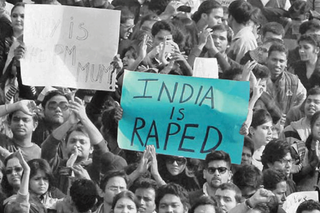
Kathua Rape Case Verdict Offers a Hollow Sense of Justice
A swift verdict doesn’t herald larger change in the handling of sexual violence.

Six of seven men accused in the Kathua rape case of January 2018 were convicted by a special court in Pathankot on Monday. One accused – also the chief conspirator’s son – was acquitted for want of evidence.
Here’s the good news: when the Kathua rape case happened, India was up in arms. Across the country, people flooded the streets demanding justice for the girl. Sensing the palpable anger, the Supreme Court fast-tracked the case, directing the special court to hold daily hearings and a private trial, away from the media. In one year, both the prosecution and the defense counsels examined 114 witnesses and presented a case that was adjudicated, and a verdict was promptly announced.
This Kathua verdict is a welcome breather for India’s criminal justice system, overburdened at its best and broken at its worst. For a case this publicized, politicized, communalized and complex, a one-year-long trial and verdict is no small feat. After the Nirbhaya tragedy in 2012, there was a rallying cry to “fast-track” such extreme cases of sexual violence in courts. Seven years later, India has perhaps seen this system work for the first time with relative honesty and grace.
And now, the bad news.
Related on The Swaddle:
Netflix’s ‘Delhi Crime’ Tackles Rape, But Not Rape Culture
The Kathua rape case was communal to begin with. According to the 15-page chargesheet, the entire plan was strategically crafted to remove the Bakarwals, the Muslim nomadic community to which the victim belonged, from the area. The convicted were Hindus, four of them being police officers. To make matters worse, a few Hindu politicians were seen taking out protest rallies in defense of the (Hindu) accused right after the crime; these leaders were forgiven with a slap on the wrist.
A few weeks after India took to the streets to demand justice for the little girl, India forgot and moved on to the next rape, the next scandal, the next meme. In a country where a salacious media moves fast to the next big story – the more communal, the better – and where a woman is raped every 13 minutes, the Kathua rape case became a namesake watershed moment which, while kickstarting the conversation around sexual violence against women, failed to have a long-term or permanent impact on the collective consciousness of the country.
In August 2018, the government amended the Protection of Children from Sexual Offences (POCSO) Act to make the rape of girl children below 12 punishable with the death penalty. But to no one’s surprise, the tokenist legislating of stiffer punishment is not acting as a deterrent. If anything, things may have become worse because, perversely, the death penalty could motivate the killing of abused minor girls in order to destroy evidence of rape and other brutalities.
In the last few weeks alone, five cases of heinous crimes against minor girls have come to light from Uttar Pradesh and Madhya Pradesh, with the worst being the abduction, brutalization and murder of a 2-year-old girl in Aligarh, the burned pieces of whose body were found disposed off in a garbage dump. Several thousand other rape cases haven’t even made it beyond police registers, if they make it there in the first place.
Related on The Swaddle:
Death Penalty for Child Sexual Abusers Is Not a Good Idea
So, what is the solution to this never-ending problem with its roots deeply intertwined in complex social, economic, religious and cultural realities of a country that simply can’t seem to shake off its all-pervasive misogyny?
There isn’t one answer. It’s our judiciary keeping up the urgent tempo it successfully built in the Kathua case, with the apex court keeping a stern eye on all proceedings. All this, while somehow tackling the immense backlog of more than 1 lakh pending rape cases in our courts. It’s our media finding the restraint to let the police examine and the court adjudicate while responsibly reporting verified, objective facts alone. It’s our police following due process in filing of FIRs and charge-sheets, bettering their collection of forensic evidence with honesty and extending humane treatment to victims instead of slut-shaming them or dismissing their experiences, which discourageswomen from reporting assault in the first place. It’s our politicians abiding by the oath they take to uphold the Constitution of India and to ensure to all its citizens dignity of life, equality and justice irrespective of sex, caste or religion. And it’s, of course, our education system, our movies, our songs and all other messaging we produce and consume as a society, which needs to change to slowly uproot the patriarchal mindset created by a cultural conditioning so toxic, the monster it has created seems insurmountable.
The parents of the 8-year-old Kathua rape case victim were not present in court on Monday. They had taken their herd and left for the annual trek their tribe makes up the Pir-Panjal range. When asked why, they simply said, they saw no point in staying. They hoped for the worst punishment for the perpetrators, but had no hope in the system.
Convicts Sanji Ram, Parvesh Kumar and Deepak Khajuria, accused of kidnapping, murder, gangrape and criminal conspiracy in the Kathua rape case, were awarded life imprisonment. The other three, convicted of destroying evidence of offence and giving false information to shield the offenders, police officers Surender Verma, Anand Dutta and Tilak Raj, were sentenced to five years in jail.
When the father was told that one of the seven accused was acquitted for lack of evidence, he told The Quint that, according to the police, it was that very person who had been the most gruesome in brutalizing his daughter. The Kathua verdict is of little solace to his wife and him, and it makes no girl or woman in India feel any safer, so what is it good for?
Pallavi Prasad is The Swaddle's Features Editor. When she isn't fighting for gender justice and being righteous, you can find her dabbling in street and sports photography, reading philosophy, drowning in green tea, and procrastinating on doing the dishes.
Related


More Women Are Authoring Medical Research Than Ever Before
